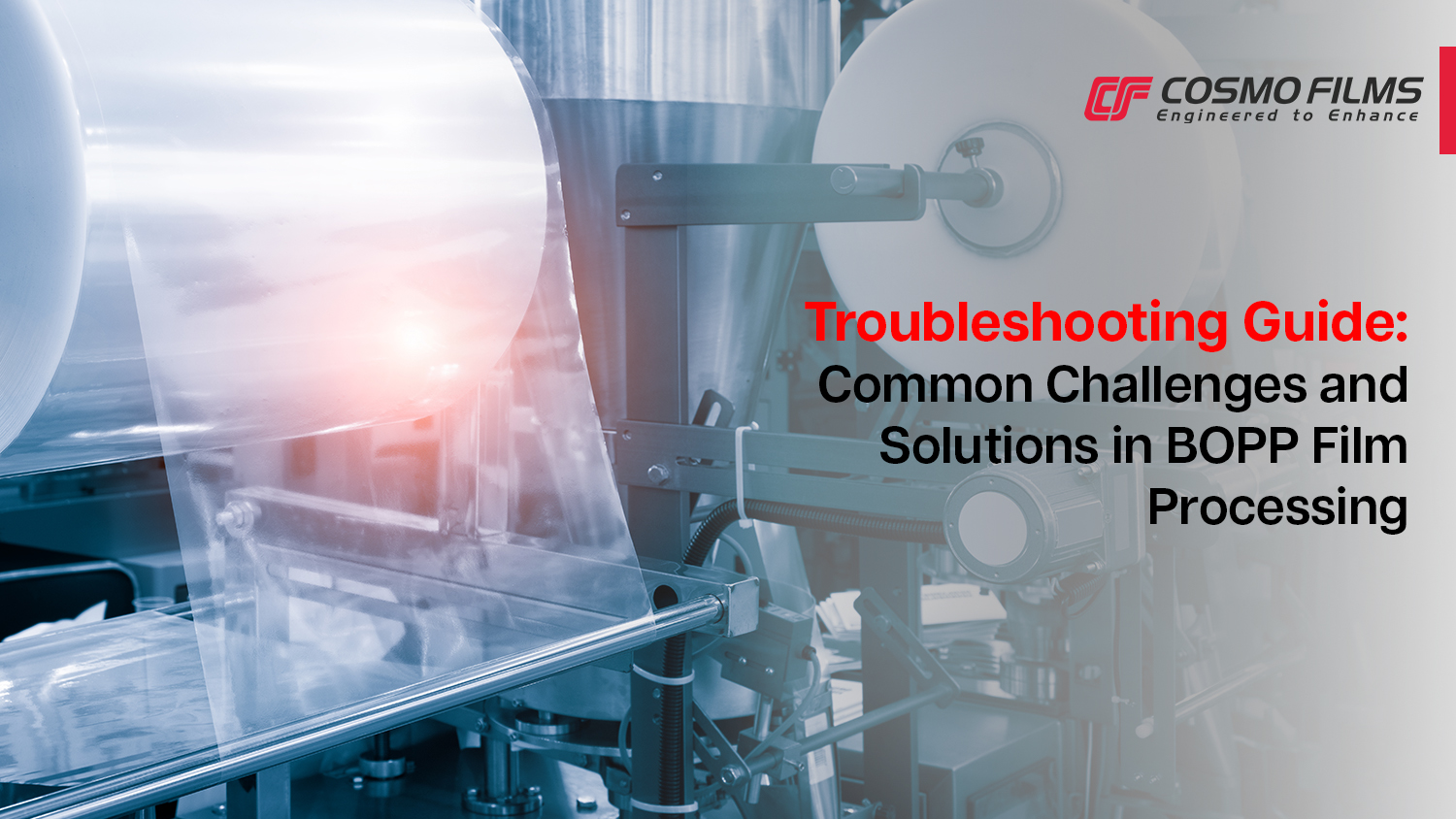Love to hear from you!
Get in touch.

Biaxially Oriented Polypropylene, or BOPP films, is a preferred choice across various industries due to its versatility, durability and cost-effectiveness. But the journey of these films, right from the raw material to the finished film, is quite challenging as it involves intricate processing.
Let's take a look at some of these challenges to understand them better and also discuss some effective solutions that are vital in achieving consistent quality while enhancing production efficiency.
An Insight Into BOPP Film Processing: Challenges & Solutions
The manufacturing process of the BOPP films might seem straightforward, but it's actually quite challenging. These challenges faced by BOPP Film manufacturers in India include films getting wrinkly, not sticking properly, or other external environmental factors. Let's take a look at these challenges and innovative solutions that make BOPP filmmaking smoother.
1. Wrinkling Defects : Generally caused by uneven tension, misalignment, or excessive processing speed due to wrinkles, the film's uniformity is compromised. This affects its quality and performance.
Solution: Advanced tension control systems must be employed to ensure uniform tension across the film during processing.
2. Edge Defects : Irregular edges are caused by misaligned slitters, blade dullness, or improper settings. This results in production halts and reduces the film's usability.
Solution: The aligned slitter must be regularly maintained to ensure sharp blades and proper settings. Also, precision cutting techniques must be implemented to avoid irregular edges.
3. Electric Issues : The film's quality is impacted as static electricity becomes a constraint in dry environments or high-speed processing. This also causes handling difficulties.
Solution: To mitigate static electricity buildup, anti-static additives or treatments must be incorporated into the film. In the dry environment, ionizers can be introduced to reduce static.
4. Inconsistent Thickness : At times, there are variations in the film's thickness if there are issues with the die setting, uneven stretching or cooling discrepancies.
Solution: The die settings must be regularly calibrated and optimized. The stretching of the film must be done evenly to maintain uniform thickness.
5. Optical Defects : The inconsistent or contaminated resin quality manifests as a visual defect and reduces the film's visual appeal and functioning integrity.
Solution: The resin must pass stringent quality checks. This will help identify and eliminate any inconsistencies or contaminants. Also, ensure high-quality, uncontaminated resin sourcing.
6. Adhesion Problem : Sometimes, surface contaminants or inadequate surface treatment stand in the way of the film's ability to stick to coatings or printing, which impacts its usability.
Solution: To enhance the film's adhesion, ensure that the surfaces are cleaned properly. Also, implement effective surface treatments and make sure that the contaminants are removed before coatings or printing applications.
7. Temperature Variability : The Biaxially Oriented Polypropylene Films are very sensitive to fluctuating temperatures during processing. The variability in the temperature affects the films' mechanical properties, thickness and appearance.
Solution: Install precise temperature control systems throughout the production line and adjust the temperatures as required to maintain consistency.
8. Roll Formation Issues : The uniform roll formation is essential for winding, storage and handling of the BOPP film.
Solution: The winding and storage system must be improved to ensure uniform roll formation, minimize handling issues and maintain proper storage.
9. Environmental Factors : There are external factors like humidity and contaminants that can impact the BOPP film's quality when it's in processing.
Solution: A controlled processing environment must be maintained to minimize the impact of external factors such as contaminants or humidity. Also, certain measures that regulate and control environmental conditions must be implemented.
BOPP film production is not easy - it comes with issues like uneven thickness, wrinkles, adhesion problems, and other external environmental factors. But there is a solution for every problem that ensures the production of high-quality films.
Better machinery and control systems must be employed to tackle the issues related to uneven edges and wrinkles. Specialized materials and adjusting processing methods can help combat the problems related to thickness and appearance. Solutions like improved cleaning techniques, precise temperature control, and better storage methods must be implemented to maintain film quality.
Overall, the solutions in the blog above pave the way for consistent and high-quality BOPP films that ensure an efficient and reliable production process. These serve as valuable tools to empower BOPP Films Manufacturers to overcome problems and consistently deliver excellent products to various industries.
Featured Post
Love to hear from you!
Get in touch.